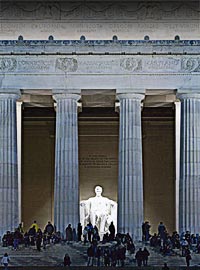| “Affirmative” Action: Is Outlawing Discrimination Unconstitutional? |
 |
|
By Timothy H. Lee
Thursday, October 17 2013 |
Does the Constitution prohibit states from outlawing the racial discrimination regime euphemistically known as “affirmative action?” Stated differently, does the Equal Protection Clause prohibit laws requiring equal protection? Believe it or not, the U.S. Supreme Court is actually being forced to answer that question. Even more disturbingly, one of our nation’s appellate courts actually accepted the argument that states cannot prohibit affirmative action discrimination. Here’s what the 14th Amendment’s Equal Protection Clause reads, in relevant part: “No State shall … deny to any person within its jurisdiction the equal protection of the laws.” When that amendment was ratified, America had just emerged from the Civil War, which remains its deadliest conflict by a substantial margin. To ensure that those sacrifices were not in vain, the nation enacted the 13th, 14th and 15th Amendments to add legal force behind the Declaration of Independence’s recognition that “all Men are created equal.” That concept seems simple enough. A nation established on the principle that all men are created equal, and which shed blood affirming that principle, determined that the state should not penalize its citizens on the basis of race. In subsequent years, that protection was extended to such categories as sex, sexual orientation and others. Regrettably, it took decades for the nation to actively enforce that doctrine of equal protection. In fact, the ideal remains unfulfilled. Consider that nearly four decades ago, the Supreme Court dubiously carved an exception to equal protection in the form of “affirmative action” in the name of remediation and diversity. Subsequent rulings have thankfully narrowed that exception, but state-sanctioned discrimination on the basis of race still exists. At no point, however, has the Supreme Court held that states must impose affirmative action laws, only that they are permitted to do so in narrow circumstances. Which brings us to the current controversy. In 2006, voters in the blue state of Michigan overwhelmingly approved an initiative ending affirmative action discrimination in public education, contracting and employment. Three years earlier, the Supreme Court had narrowly allowed University of Michigan law school admission preferences to survive, so the state’s electorate decided to settle the question for good. The liberal grievance industry considered that objectionable, and per habit filed suit. Under their novel – to put it charitably – legal argument, outlawing racial preferences made it more difficult for various racial groups to seek racial preferences. According to their argument, the 14th Amendment doesn’t really mandate equal protection. Rather, it exists to “protect minority rights against a white majority.” That is not a misprint. The problem for plaintiff group By Any Means Necessary, or BAMN, is that the Supreme Court has never accepted that proposition. The following exchange occurred during oral argument this week: Shanta Driver, Plaintiffs’ Counsel: We ask this Court to uphold the Sixth Circuit decision … to bring the 14th Amendment back to its original purpose and meaning, which is to protect minority rights against a white majority, which did not occur in this case. Justice Antonin Scalia: My goodness. I thought we’ve – we’ve held that the 14th Amendment protects all races. I mean, that was the argument in the early years, that it protected only blacks. But I thought we rejected that. You now say that we have to proceed as though its purpose is not to protect whites, only to protect minorities? Driver: And it’s a measure in which the question of discrimination is determined not just by power, by who has privilege in this society, and those minorities that are oppressed, be they religious or racial, need protection from a more privileged majority. Scalia: Do you have any case of ours that propounds that view of the 14th Amendment, that it protects only minorities? Any case? Driver: No case of yours. Unfortunately, an 8-7 majority on the Sixth Circuit Court of Appeals nevertheless accepted plaintiffs’ astonishing argument. Consequently, the Supreme Court must now undertake some judicial housekeeping that shouldn’t be necessary. Given the current Court’s slim majority and recent decisions on this issue, it is difficult to imagine it accepting the plaintiffs’ claim. Nevertheless, this case once again highlights the narrow Supreme Court majority protecting the nation against this sort of Orwellian contagion. It also highlights the critical importance of electing a President and Senate who will appoint judges and justices more mindful of Constitutional text than fashionable political grievances and novel legal theories. As Chief Justice John Roberts wrote in another affirmative action discrimination decision, “The way to stop discrimination on the basis of race is to stop discriminating on the basis of race.” The fact that it requires another Supreme Court decision to affirm states’ rights to do just that highlights the peril of a possible future leftward shift in its membership. |
Related Articles : |
























